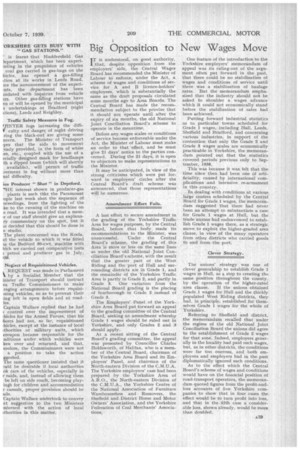Big Opposition to New Wages Move
Page 21

If you've noticed an error in this article please click here to report it so we can fix it.
IT is understood, on good authority, that, despite opposition from the employers' side, the Central Wages Board has recommended the Minister of Labour to enforce, under the Act, a scheme of wages and conditions of service for A and B licence-holders' employees, which is substantially the same as the draft proposals circulated some months ago to Area Boards. The Central Board has made the recommendation subject to the proviso that it should not operate until after the expiry of six months, the old National Joint Conciliation Board's scheme to operate in the meantime.
Before any wages scales or conditions of service become enforceable under the Act, the Minister of Labour must make an order to that effect, and he must give 21 days' notice to the parties concerned. During the 21 days, it is open to objectors to make representations to the Minister.
It may be anticipated, in view of the strong criticisms which were put forward in employers' circles after the Central Board's draft scheme was announced, that those representations will be numerous.
Amendment Effort Fails.
A last effort to secure amendment in the grading of the Yorkshire Traffic Area for wages purposes, by the Central Board, before that body made its recommendations to the Minister, was unsuccessful. Under the Central Board's scheme, the grading of this Area Is more or less on the same lines as under the old National joint Conciliation Board's scheme, with the result that the greater part of the West Riding and the port of Hull and surrounding districts are in Grade I, and the remainder of the Yorkshire Traffic Area is partly in Grade 2, and partly in Grade 3. One variation from the National Board grading is the placing of Scarborough in Grade 2 instead of Grade 3.
The Employers' Panel of the Yorkshire Area Board put forward an appeal to the grading committee of the Central Board, seeking an amendment whereby Grade I wages should be ruled out in Yorkshire, and only Grades 2 and 3 should apply.
At a recent sitting of the Central Board's grading committee, the appeal was presented by Councillor Charles HoIdsworth, of Halifax, who is a member of the Central Board, chairman of the Yorkshire Area Board and its Employers' Panel, and chairman of the North-eastern Division of the C.M.U.A, The Yorkshire employers' case had been prepared by the Yorkshire Area of A.R.O., the North-eastern Division of the C.M.T.J.A., the Yorkshire Centre of the National Association of Furniture WarehouseMen and Removers, the Sheffield and District Horse and Motor Owners' Association, and the' Yorkshire Federation of Coal Merchants' Associations:
One feature of the introduction to the Yorkshire employers' memorandum of appeal was its ruling-out of the argument often put forward in the past, that there could be no stabilization of wages and conditions of service until there was a stabilization of haulage rates. But the memorandum emphasized that the industry should not be asked to shoulder a wages advance which it could not economically stand before the stabilization of rates had been achieved.
Putting forward industrial statistics as to particular towns scheduled for Grade 1 wages, including Hull, Leeds, Sheffield and Bradford, and concerning various industries, in support of the contention that only the Grade 2 and Grade 3 wages scales are economically practicable in Yorkshire, the memorandum pointed out that the statistics covered periods previous only to September, 1938.
This was because it was felt that the time since then had been one of artificiality, caused by international complications and intensive re-armament in this, country.
In. dealing with conditions at various large centres scheduled by the Central Board. for Grade 1 wages, the memorandum suggested that there had never been an attempt to substantiate a case for Grade I wages at Hull, but the trade unions had endeavoured to establish Grade I wages there, as a strategic move, to exploit the higher-graded area clause, in view of the many operators from other districts who carried goods to and from the port.
Clever Strategy.
The unions' strategy was one of clever generalship to establish Grade I wages in Hull, as a step to creating the same position throughout the• county, by the operation of the higher-rated area clause. If the unions obtained Grade I wages for Hull and the thickly populated West Riding districts, they had, in principle, established for themselves Grade 1 wages for the whole of Yorkshire.
Referring to Sheffield and district, the memorandum recalled that under the regime of the old National Joint Conciliation Board the unions did agree to the establishment of Grade 2 wages for that zone. Indeed, employers generally in the locality had paid such wages, but, as in other districts, the conditions were far too onerous, and both employees and employers had in the past diplomatically ignored such conditions.
As to the effect which the Central Board's scheme of wages and conditions would have on the financial position of road-transport operators, the memorandum quoted figures from the profit-andloss accounts of five Yorkshire companies to show that in four cases the effect would be to turn profit into loss, and that in the • fifth case a considerable loss, shown already, would be more than doubled.




















































